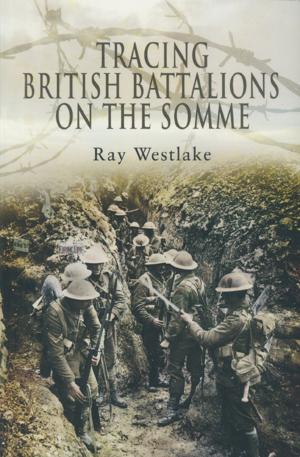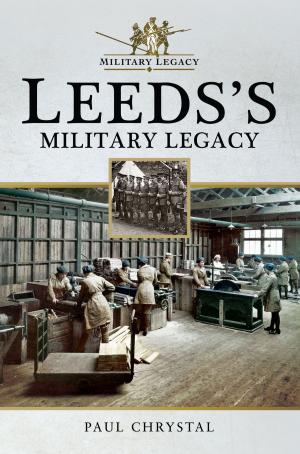Frankforce and the Defence of Arras 1940
Nonfiction, Reference & Language, Reference, Atlases, History, Military, World War II| Author: | Jerry Murland | ISBN: | 9781473852709 |
| Publisher: | Pen and Sword | Publication: | October 30, 2017 |
| Imprint: | Pen and Sword Military | Language: | English |
| Author: | Jerry Murland |
| ISBN: | 9781473852709 |
| Publisher: | Pen and Sword |
| Publication: | October 30, 2017 |
| Imprint: | Pen and Sword Military |
| Language: | English |
There is no other city in France that has the same associations in time of conflict that the British have with Arras. Since the campaigns of John Churchill, 1st Duke of Marlborough, in the early 18th century, British soldiers have fought in and around Arras, occasionally as an enemy but, more often, as defenders of French and Allied democracy. Battlefield visitors to the area will immediately recognize the names of towns and villages that were as significant to the men of Marlborough’s army as they were to those who fought in the First and Second World Wars.
This book serves both as guide to the Second World War battlefields that surround the city and its environs as well as detailing the actions of the British armored attack of 21 May 1940. The book looks at the strategic situation that led up to the famous Arras counterstroke and, using material that has not been published before, examines the British and German actions between 20 and 23 May. The only Victoria Cross action that took place during this time is looked at in detail; as is the fighting that took place in Arras and during the breakout.
Despite its shortcomings, the counterstroke achieved the essential element of surprise and caused widespread alarm amongst the German command and hit Rommel’s 7th Panzer Division at precisely the moment when his armored units were ahead of the infantry and gunners. The British infantry fought well and both the Durham battalions were fortunate that their commanding officers and senior NCOs were men who had already fought in one conflict and possessed the determination to rally their less experienced junior ranks and fight on regardless. Such was the case with the two tank battalions, although sadly they lost both their commanding officers and over half the tanks that went into the engagement. The attack did enable the British to tighten their hold on Arras – albeit temporarily – and, as is often cited, built doubts in the minds of German High Command as to the speed of their advance and contributed to the subsequent Hitler halt order of 24-27 May.
The author has gone to some lengths to track down accounts from those individuals who served in the area during May 1940 and fought the enveloping tide of the German advance
The book is supported by three car tours, one of which takes the visitor along the tragic path taken by the Tyneside Scottish on 20 May and two walking routes, which concentrate on Arras.
137 black and white photographs (integrated) and a number of maps derived from regimental histories; and six tour maps provide the battlefield visitor with illustrations of the battlefields as they were in 1940 and as they are today.
There is no other city in France that has the same associations in time of conflict that the British have with Arras. Since the campaigns of John Churchill, 1st Duke of Marlborough, in the early 18th century, British soldiers have fought in and around Arras, occasionally as an enemy but, more often, as defenders of French and Allied democracy. Battlefield visitors to the area will immediately recognize the names of towns and villages that were as significant to the men of Marlborough’s army as they were to those who fought in the First and Second World Wars.
This book serves both as guide to the Second World War battlefields that surround the city and its environs as well as detailing the actions of the British armored attack of 21 May 1940. The book looks at the strategic situation that led up to the famous Arras counterstroke and, using material that has not been published before, examines the British and German actions between 20 and 23 May. The only Victoria Cross action that took place during this time is looked at in detail; as is the fighting that took place in Arras and during the breakout.
Despite its shortcomings, the counterstroke achieved the essential element of surprise and caused widespread alarm amongst the German command and hit Rommel’s 7th Panzer Division at precisely the moment when his armored units were ahead of the infantry and gunners. The British infantry fought well and both the Durham battalions were fortunate that their commanding officers and senior NCOs were men who had already fought in one conflict and possessed the determination to rally their less experienced junior ranks and fight on regardless. Such was the case with the two tank battalions, although sadly they lost both their commanding officers and over half the tanks that went into the engagement. The attack did enable the British to tighten their hold on Arras – albeit temporarily – and, as is often cited, built doubts in the minds of German High Command as to the speed of their advance and contributed to the subsequent Hitler halt order of 24-27 May.
The author has gone to some lengths to track down accounts from those individuals who served in the area during May 1940 and fought the enveloping tide of the German advance
The book is supported by three car tours, one of which takes the visitor along the tragic path taken by the Tyneside Scottish on 20 May and two walking routes, which concentrate on Arras.
137 black and white photographs (integrated) and a number of maps derived from regimental histories; and six tour maps provide the battlefield visitor with illustrations of the battlefields as they were in 1940 and as they are today.















